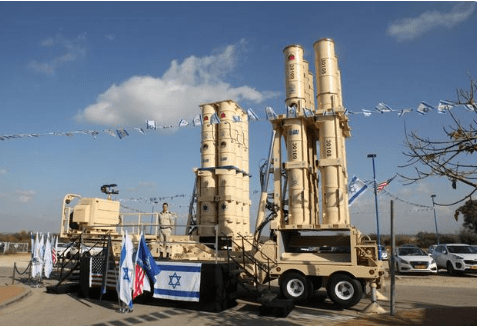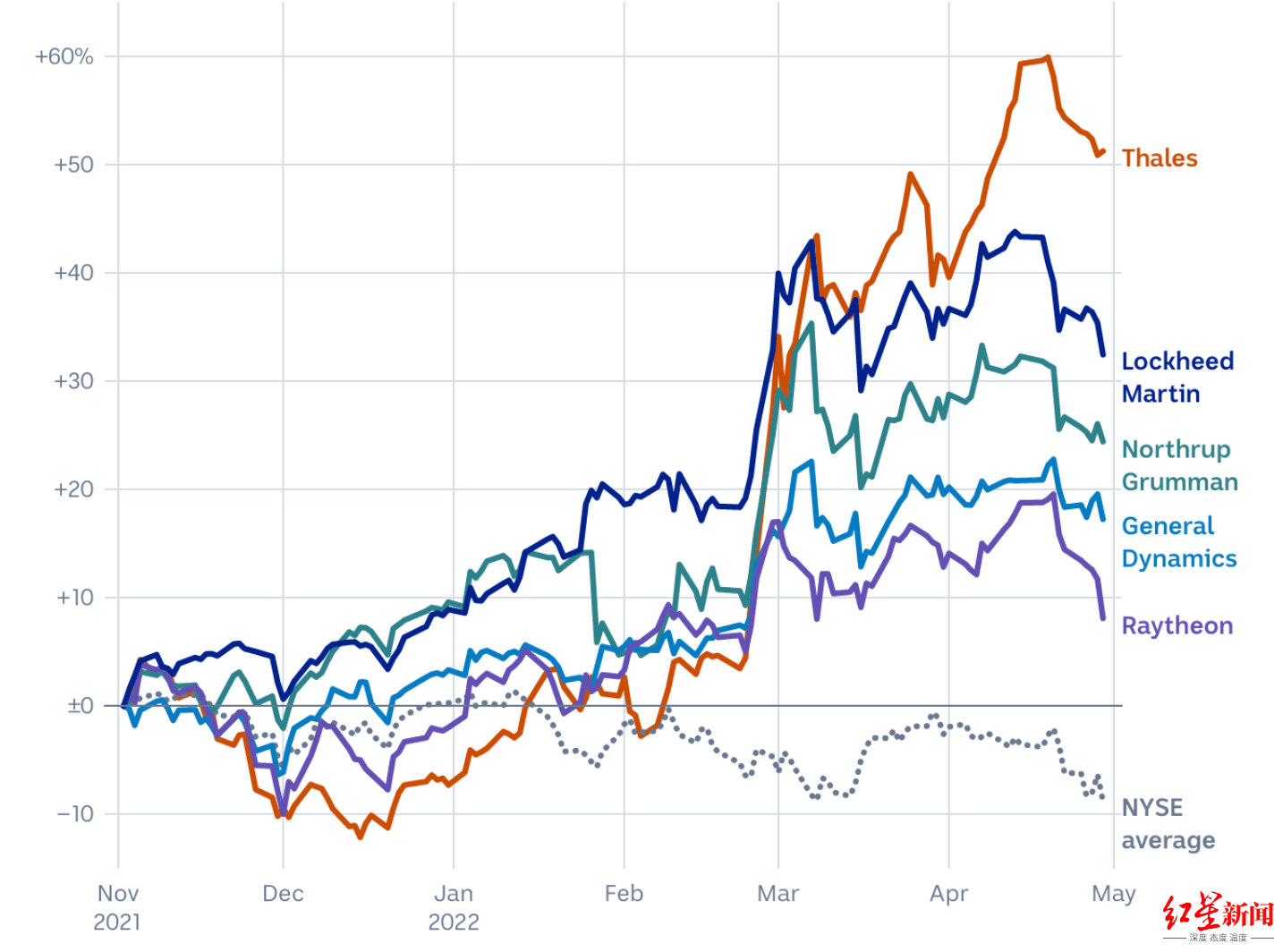Original title: Western arsenals “quickly” exhausted the U.S. military’s fire dealers and made “war fortunes”, behind which are the lawmakers holding military stocks
According to a report by Chinanews.com on May 7, on the 6th local time, US President Biden announced the provision of military assistance to Ukraine in the form of “additional artillery, radar and other equipment”. Biden also said that the United States and Ukraine’s other international partners will continue to keep arms and ammunition flowing to Ukraine.
U.S. media quoted Marcus, a senior analyst at the Australian Strategic Policy Institute, as saying that the West’s arms stockpiles are being exhausted “at a very fast rate”. As a result, U.S. military enterprises will receive a large number of orders and become the biggest beneficiaries. . Markus explained: “Most of the weapons and equipment that the West provides to Ukraine is taken from the national inventory. The government needs to sign new orders with military enterprises to replenish the inventory while depleting the inventory.”
According to reports, since the outbreak of the Russian-Ukrainian conflict, the United States has provided Ukraine with 7,000 “Javelin” anti-tank missiles, accounting for one-third of its total inventory. Analysts at US think tanks say it will take 3-4 years for the US to make up the inventory. Marcus believes that once the United States or other countries begin to replenish their inventories, American military-industrial enterprises will receive a large number of orders and become the biggest beneficiaries.
According to reports, since the United States declared its founding in 1776, in the more than 240 years of history, the United States has not participated in wars for less than 20 years. According to incomplete statistics, from the end of World War II in 1945 to 2001, 248 armed conflicts occurred in 153 regions of the world, of which 201 were initiated by the United States, accounting for about 81%. At the same time, the United States continues to make “war wealth” from it.
As Franklin, a former Defense Department official, said, the U.S. military-industrial complex used the Russian-Ukrainian conflict to incite fears of Russia in order to push up arms spending. “Since the outbreak of the Russian-Ukrainian conflict, champagne has been quietly popped in the Pentagon, K Street (the gathering place for lobbying companies in Washington, the capital of the United States), the military industry, and the entire Capitol!”
▲ In Washington, the capital of the United States, a woman walked by near the Capitol.
In early March, Franklin pointed out that over the past 30 years, the U.S. “military-industrial complex” has been in unison with the U.S. media, think tanks, academia, and intelligence agencies, and the entire chain of interests will make a lot of money in the Russia-Ukraine conflict. It is reported that the military-industrial complex refers to a huge interest group formed by the US military, military-industrial enterprises, government, Congress and other groups for mutual benefits. As early as the 1950s, the then US President Eisenhower warned the American people to be wary of the harm caused by the “monster” of the “military-industrial complex”.
However, the warning did nothing. Over the years, the United States has formed a set of “war profit mechanisms” driven by a huge military-industrial complex. On the one hand, from Europe to the Middle East, from the Asia-Pacific to Latin America, American politicians continue to create “business opportunities” for American arms dealers by strengthening alliances, inciting confrontation, and inciting conflicts; The combination of the two continues to push up U.S. defense spending, at the expense of the American people who are taxpayers.
It is reported that the five giants of the US military industry: Lockheed Martin, Raytheon, Northrop Grumman, Boeing and General Dynamics have all made a fortune due to the war, and in this Russian-Ukrainian conflict, these military enterprises have Once again, I made a lot of money and got a large order. Expert analysis said that orders from the US government alone cannot satisfy the appetite of these military enterprises. The urgent need for weapons and equipment in other Western countries caused by the conflict between Russia and Ukraine is the “super big cake” that the US military industry really desires.
Taking advantage of Russia-Ukraine conflict to “capture” large orders from Western countries
US media has disclosed that before the escalation of the Russian-Ukrainian conflict, the leaders of major US arms companies have begun to talk about how tensions in Europe will increase their profits. In January, Raytheon CEO Greg Hayes boasted on a conference call with the company’s investors that the prospect of conflict in Eastern Europe and other global hotspots would benefit the company’s business, “We see an opportunity for international sales. “.
The report said that, benefiting from the tension between Russia and Ukraine and the subsequent escalation of the conflict, Lockheed Martin and Raytheon will receive huge profits of up to billions of dollars. Lockheed Martin, which mainly produces military aircraft, has received orders from Germany totaling more than $4 billion. It is reported that after the outbreak of the Russian-Ukrainian conflict, German Chancellor Scholz announced that he would use 100 billion euros of “Bundeswehr special assets” to modernize the German army. Among them, the most concerned is that the German Air Force has finalized the purchase of 35 US-made F-35 stealth. The F-35 stealth fighter is a product of Lockheed Martin.
▲F-35 fighter jet production line
In addition, Canada also confirmed on March 28 that it has selected the F-35 as its preferred model for its next-generation fighter jet, and will spend $15 billion to procure up to 88 F-35s. James, CEO of Lockheed Martin, also revealed in an interview with foreign media that with the continuation of the conflict between Russia and Ukraine, the demand for the company’s products in many countries around the world has increased significantly. He also said the company was working to “elevate our supply chain.” In a statement, it also mentioned that the company will increase investment in production capacity and seek ways to “further increase production capacity.”
Previously, the United States sent a large number of “Stinger” missiles to Ukraine, its manufacturer is the United States Raytheon. According to reports, because the U.S. military determined that the future demand is not high, the “Stinger” missile has been discontinued before, but after the outbreak of the Russian-Ukrainian conflict, the U.S. media said that the “Stinger” missile production line has been restarted to meet the needs of foreign military sales. Raytheon CEO Hayes said on the company’s earnings call last week that it would speed up production. “I expect the company will see bigger restocking orders, and our Stinger line is very popular right now,” he said.

▲Israeli “Arrow-3” missile defense system
In addition, Germany also confirmed that it will spend 2 billion euros to buy the “Arrow-3” missile defense system. The “Arrow-3” system is jointly developed by Israel Aerospace Industries and Boeing. In fact, Boeing not only produces civilian aircraft, but is also an important supplier to the US Department of Defense. According to foreign media reports on April 28, Boeing added more than $1 billion in new accounting charges for the defense sector in the first quarter, including $212 million in pre-tax charges related to the Russian-Ukrainian conflict, which was delayed with the “Air Force One” project. And a $660 million charge for cost increases and a $367 million charge for the T-7A Red Hawk program.
Another military giant known for its radar and electronic technology, Northrop Grumman, is deeply involved in the construction of Poland’s anti-missile system and is responsible for producing software and hardware equipment for Poland’s air defense and missile defense combat command system.
Anti-war activists: Military industry ruled America
The close relationship between the military industry and the government is one of the characteristics of the “military-industrial complex” of the United States. Four of the past five U.S. Secretary of Defense came from one of the five largest arms contractors.
According to foreign media reports, Boeing, one of the five giants of the US military industry, said on May 5, local time, that it will move its headquarters from Chicago to Arlington, Virginia, and establish a research and development and technology center in the Arlington area. It is worth noting that the area is home to the Pentagon and is across the river (Potomac River) from Washington, the capital of the United States. Boeing President Dave said that “moving” is of strategic importance to Boeing. He believes that this will allow Boeing to have a closer relationship with the relevant customers.

▲After the conflict between Russia and Ukraine, the stock prices of many military enterprises soared. Source: ABC
In addition to “receiving” large orders, the stock prices of major military companies have also risen since the outbreak of the Russian-Ukrainian conflict. According to reports, after the outbreak of the Russian-Ukrainian conflict, the stock prices of major US military industry companies rose sharply. Shares of Lockheed Martin have surged more than 30% this year, Raytheon Technologies has risen 17% over the same period, and Northrop Grumman and General Dynamics have also surged.
And U.S. congressmen have also shown great interest in investing in military-industrial enterprises or buying stocks of related military-industrial enterprises. In an analysis of federal financial records last year, U.S. media found that in the U.S. Congress, from seasoned veterans to fledgling new congressmen, at least 15 lawmakers who control U.S. military policymaking participated in investing in military-industrial enterprises or holding hands. Plenty of military-industrial stocks.
According to US media reports, Sen. Jim, a Tennessee Democrat, holds $65,000 worth of General Dynamics stock, of which $50,000 worth of stock is deposited in his personal account and $15,000 of stock is deposited in his account for his children. middle. The wife of Congressman Khanna, a California Democrat, bought hundreds of thousands of dollars worth of shares in Boeing, Raytheon, Northrop Grumman and General Dynamics in 2020. The new Republican Congressman Pat was also revealed to have bought and sold $1.4 million worth of Boeing shares this year, in addition to holding $50,000 in General Dynamics stock.

The US media also broke the news that according to a financial statement of a member of the US congressional military commissioner, a number of companies engaged in military manufacturing, including Lockheed Martin, Raytheon, General Dynamics, etc., spend at least millions of dollars every year. Lobbying the federal government to instigate officials to develop policies and sign “lucrative” contracts with companies.
Senator Gary Peters, a Democrat from Michigan, owns shares in Raytheon and is a member of the Senate Armed Services Committee, according to the Communist Youth League.
The military council is responsible for authorizing the approval of the Pentagon’s budget. In March, the committee urged President Biden to increase defense spending by 5% in fiscal 2023.
According to CCTV News, citing foreign media sources, Oregon Democrat Rep. Earle purchased 31 stocks including Raytheon and other military industrial companies on the day Russia launched a special military operation. Nearly $500,000 was traded that day. In the recent annual personal financial information report, the US media also found that his wife holds $500,000 in shares of Northwest Natural Gas Company, where he serves as senior vice president and general counsel. Rep. John Rothford of Florida also bought a huge amount of Raytheon stock on the day Russia launched the special military operation.

It is worth mentioning that John Rothford is not only a member of Congress, but also a member of the House Appropriations Committee, which is responsible for federal government spending. In this capacity, he also serves on the Homeland Security Subcommittee and subcommittees on Military Construction Programs, Veterans Affairs (Department), and related agencies. According to US media, he has considerable influence in budget formulation and government military construction projects. Moreover, on the day of his purchase of military stocks, he also accused Russia on social media and claimed to do everything in his power to help Ukraine.
Anti-war activist Mitia Benjamin was appalled at the power of the US military-industrial complex. Benjamin said: “I found that the American people do not rule the United States, the Democrats do not rule the United States, the military industrial enterprises rule the United States. I have been studying war, and I am amazed by the power of the arms manufacturers and the power of the contractors. Big. They have the ability to keep the conflict going. When you think about it, it’s pretty shocking.”
Red Star News reporter Fan Xu intern reporter Li Jinrui
Edited by Guo YuReturn to Sohu, see more
